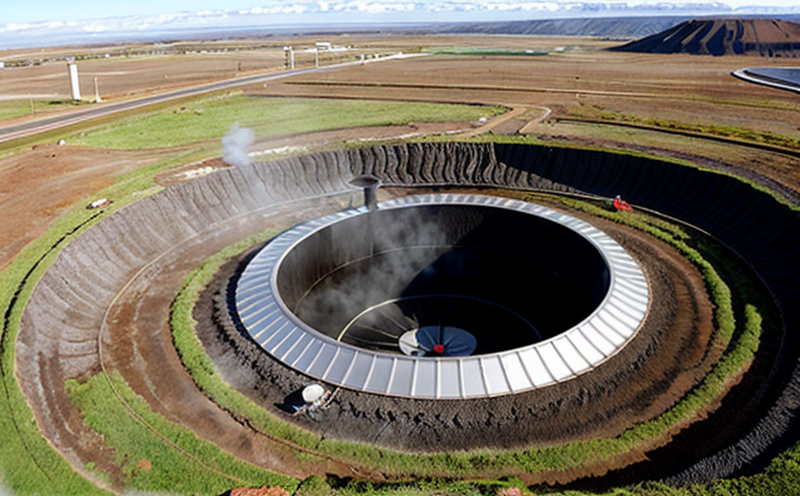ASTM C876 Corrosion Potential Testing in Concrete Structures
The geothermal energy sector is crucial for sustainable and renewable energy solutions. Ensuring the integrity of concrete structures that support geothermal systems, such as concrete encasements around pipelines or other critical components, requires robust testing methods. ASTM C876 provides a standardized approach to corrosion potential testing in concrete, which helps identify the presence of corrosive environments and assess the potential for reinforcement steel corrosion.
The test method measures the electrochemical potential differences between embedded reinforcing steel bars and the surrounding concrete matrix. This information is critical for evaluating the protective cover thickness, chloride intrusion, and the overall durability of the structure. Understanding these parameters allows engineers to implement appropriate mitigation strategies before significant damage occurs.
ASTM C876 testing is particularly relevant in geothermal applications where water containing high concentrations of chlorides is often used during drilling or fracturing processes. Chloride ions can penetrate concrete and reach embedded steel, initiating corrosion reactions that degrade the structural integrity over time. This test helps to ensure that any necessary remedial measures are implemented promptly.
The testing procedure involves embedding a reference electrode in the concrete structure along with one or more corroding electrodes (such as carbon rods). The potential difference between these electrodes is measured using a potentiostat, providing data on the corrosivity of the environment. This information can then be used to predict the likelihood of corrosion and its rate.
Understanding the results from ASTM C876 testing is essential for making informed decisions about maintenance schedules, material choices, and design modifications. For instance, if high chloride content or a low protective cover thickness is detected, further investigation into the source of chlorides may be warranted, along with potential changes to concrete mix designs or coatings.
By leveraging ASTM C876 testing, quality managers and R&D engineers can ensure compliance with international standards while optimizing their geothermal energy systems. This method provides a clear picture of the corrosive environment within concrete structures, enabling proactive measures that enhance long-term performance and safety.
Why It Matters
The integrity of concrete structures in geothermal applications is vital for maintaining operational efficiency and minimizing maintenance costs. Corrosion potential testing using ASTM C876 helps to identify early signs of degradation, allowing for timely interventions that prevent more extensive damage.
- Reduces Maintenance Costs: Early detection of corrosion risks allows for targeted interventions, reducing the need for costly repairs or replacements later on.
- Promotes Safety: Ensuring structural integrity prevents potential failures that could lead to accidents or injuries.
- Enhances Sustainability: By prolonging the life of concrete structures, this testing method supports long-term sustainability goals in geothermal energy systems.
In summary, ASTM C876 testing is a cornerstone for ensuring that concrete structures in geothermal applications remain reliable and safe. It enables informed decision-making processes that balance cost-effectiveness with operational efficiency and environmental responsibility.
Industry Applications
| Application Area | Description |
|---|---|
| Geothermal Energy Systems | Evaluating the corrosivity of concrete encasements around geothermal pipelines to ensure long-term integrity. |
| Mining Facilities | Monitoring structures exposed to brine solutions used in mining processes for chloride intrusion. |
| Civil Infrastructure | Assessing concrete structures in coastal areas where chloride-laden water is a common concern. |
The testing method is particularly useful for facilities that use chlorides in their operations, such as mining or coastal civil infrastructure projects. By identifying potential corrosion risks early on, these industries can take proactive steps to protect their assets and reduce long-term expenses.
- Mining: Chloride-laden water used in mine drainage systems can lead to rapid corrosion of reinforcing steel within concrete structures.
- Civil Infrastructure: Coastal environments expose concrete structures to saltwater, which can accelerate the degradation process if not properly managed.
In these applications, ASTM C876 provides a reliable means to monitor and address potential issues before they become critical problems. This ensures that structures remain safe and operational for extended periods, contributing to overall sustainability and cost-effectiveness.
Eurolab Advantages
At Eurolab, we offer comprehensive services tailored specifically to meet the needs of our clients in the geothermal energy sector. Our expertise in ASTM C876 testing ensures that you receive accurate and reliable results every time.
- State-of-the-Art Facilities: Equipped with advanced equipment for precise measurements, ensuring consistency across all tests.
- Experienced Technicians: Our team comprises highly skilled professionals who are well-versed in the nuances of ASTM C876 testing.
- Comprehensive Reporting: Detailed reports that include not only numerical data but also insights into potential risks and recommendations for mitigation.
We pride ourselves on providing services that go beyond mere compliance; we aim to offer solutions that enhance the performance of your geothermal energy systems. By partnering with Eurolab, you can rest assured that your concrete structures are being evaluated using best-in-class methods.





